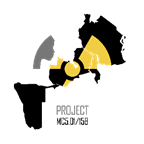 Project MC5.01/15B, titled “Support to Southern African states in Nuclear Safety and Safeguards” is conceived and funded under the EU Instrument for Nuclear Safety Cooperation. Project MC 5.01/15B seeks synergies with the EU-funded project under the Instrument contributing to Stability and Peace (IcSP), namely P 60 “Support to the Centre of Excellence of Eastern and Central Africa in Nuclear Security”. Together, they illustrate the internationally recommended “Triple S” approach addressing simultaneously the nuclear safety, safeguards and security issues.
Project MC5.01/15B, titled “Support to Southern African states in Nuclear Safety and Safeguards” is conceived and funded under the EU Instrument for Nuclear Safety Cooperation. Project MC 5.01/15B seeks synergies with the EU-funded project under the Instrument contributing to Stability and Peace (IcSP), namely P 60 “Support to the Centre of Excellence of Eastern and Central Africa in Nuclear Security”. Together, they illustrate the internationally recommended “Triple S” approach addressing simultaneously the nuclear safety, safeguards and security issues.
Geographical scope
African countries preparing to engage in mining and transportation of uranium ore concentrate through their territories: Tanzania, Zambia, Malawi and Namibia. The Secretariat of the Southern African Development Community (SADC), based in Gaborone, Botswana, seeking to coordinate the actions of the pilot participating states, and to harmonize in the future the nuclear safety legal frameworks and policies of all its fourteen member states.
Purpose and objectives
The main goal of the project is to strengthen and harmonize the nuclear regulatory frameworks in the participating countries for sustainable uranium mining, milling, processing and associated transport in the sub – Saharan region of Africa. It also seeks to enhance the nuclear safety and security policies of the participating countries and to support their efforts to fulfill their international safeguards obligations. A long-term objective of Project MC5.01/15B is to support the regional approach by strengthening the capacity of SADC to serve its member states, including through the development of a regionally harmonized system of accountancy, control and transport of radioactive and nuclear (RN) materials designed to improve the communication and interaction among the originating, transit and destination countries.
Envisaged activities
- analyze and help upgrade and harmonize on a regional basis the national regulatory frameworks, through the development of National Action Plans;
- perform a study in the four countries and at a regional level analyzing the production and transport of uranium;
- organize an exercise simulating the transport of uranium ore concentrate from Tanzania to Namibia through Malawi and Zambia, and monitoring step by step the provisions applied in the individual countries, at the border crossings and assessing the interaction at the regional level;
- organize a tabletop and a field exercise in conjunction with P- 60 project;
- set up a web-based communication system with a central server at SADC Headquarters, and fully-supported work stations at the responsible organizations in the four beneficiary countries, with a flexibility to allow further extension to other countries joining the network;
- identify the training needs during the inception phase and through the case study and address these needs, while prioritizing the training courses to be offered in line with the available budget;
- organize training modules at a regional level to strengthen networking between the participating countries.
Public Advocacy
This project will contribute to raise public awareness on nuclear safety in the participating countries through public events and media exposure, including through social media, TV discussions, a students’ debate on the peaceful use of nuclear power and presentations at specialized international exhibitions and fora.
Context
In search of development opportunities, some Eastern and Southern African countries attempt to use their uranium ore resources as a source of export revenue. For example, transportation of uranium concentrated ore is planned through the territories of Tanzania, Zambia, Malawi and Namibia, from production sites in Tanzania to the sea port of Walvis Bay in Namibia. Sustainable uranium mining and processing requires application of best international standards to avoid environmental damage and other hazards. It also implies harmonization on a regional basis of legal frameworks and policies to address the challenges at border crossings and crucial nodal points to prevent illicit trafficking of radioactive materials. The four participating countries recognize, in various form and degree, the need for regional harmonization and consider EU technical assistance essential in acquiring both scientific and organizational knowledge to successfully fulfil the nuclear safety requirements.
Quick facts:
Project duration: 36 months (November 2016 – November 2019)
Budget: € 2,5 million
Source of funding: European Commission, Directorate-General for International Cooperation and Development (DG DEVCO), Instrument for Nuclear Safety Cooperation
Implementing agency: International Science and Technology Center (ISTC)
DEVCO project manager: Geneviève Lizin (Genevieve.LIZIN@ec.europa.eu)
ISTC project manager: Kamen Velichkov (velichkov@istc.int)

